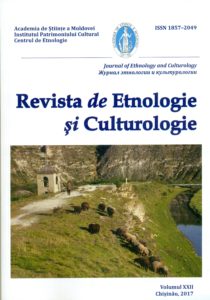Considerații generale privind joncțiunea grupuri etnoculturale – identitate – peisaje
General considerations regarding the connection
ethocultural groups – identity – landscape s
Author(s): Dorina Dragnea (Onica)Subject(s): History, Anthropology, Cultural Anthropology / Ethnology
Published by: Institutul Patrimoniului Cultural al Academiei de Științe a Moldovei
Keywords: space; ethnic group; cultural landscape;ethnographic landscape; identity;
Summary/Abstract: The space is the physical support administrated bya community for shaping landscapes. It is the territory,physically and mentally perceived, which is claimed bycommunities, in the perspective of its being used and intergated with identitary insignia. Respectively, the spacebecomes an archivist of many landscapes with high identification, symbolic and prototypical capacity. The necessityof the study is validated by the growing importance of theterritorial and cultural identity in a changing world; theloss and rapid transformation of ethnographic landscapesthat are identifiable and representative of etnocultural groups; the awareness of the importance of communitiesfor their role in completing the world cultural heritage,and their contribution to world diversity; the preservation of the economic, social, spiritual sustainability of territories, emphasizing the specifics of the identities and ofthe spaces occupied by them. Prototypes of organizationof the inhabited space and their impregnation with emotional, axiological, cognitive charge, the type of mentalityand social relations over time contribute to the crystallization and consolidation of the identification component.Since the ethnically mixed population is formed on thebasis of historical and migratory processes, a mental psychological boundary appears in the collective consciousness, perceived as a line separating “them” from “us”. Thus,the differences between ethnocultural groups correspondto those of landscapes, due to the fact that communitieshave different visions of spatial design and modeling, according to ethnic images and visions, cultural experiences,civilizational achievements. Ethnographic landscapes aresome sort of cultural seals, through which the spacial andcultural rights are claimed, de jure and de facto, by communities from one another
Journal: Revista de Etnologie şi Culturologie
- Issue Year: XXIII/2018
- Issue No: 1
- Page Range: 25-30
- Page Count: 6
- Language: Romanian

